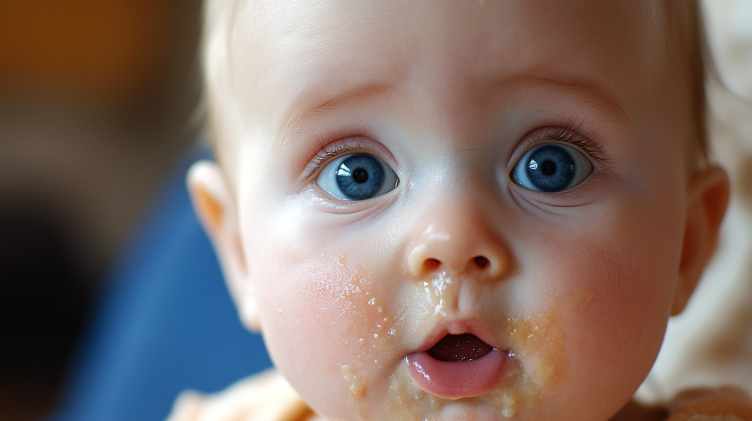For new parents, one of the most nerve-wracking things is figuring out if your baby is hungry.
How do you recognize hunger when your baby can’t tell you? It’s a question that causes stress for many parents, particularly when babies can’t speak and express their needs directly.
In this guide, we’ll help you decode the subtle signals that show your baby is hungry so you can confidently meet their needs!
1. Your Baby Makes Sucking Sounds and Moves Their Mouth
You might notice your baby making little noises with their mouth and moving it in a way that looks like they’re talking. While it might seem like random babbling, it’s likely that they’re telling you they’re hungry!
What to look for:
- Sucking noises: If you hear your baby making sucking sounds and moving their lips like they’re trying to suck something, it’s often a sign that they’re hungry.
- Mouth movements: When your baby starts making “ah” sounds or licking their lips, they are trying to let you know they want food.

What to do:
As soon as you hear these sounds, be ready to offer them milk or breastfeeding so they don’t get frustrated.
2. Baby Opens Their Mouth Wide, Looking for Food
It might seem like your baby is just playing with their mouth, but when they open it wide or make sucking gestures, it’s usually their way of showing hunger.
What to look for:
- Mouth wide open: When your baby opens their mouth wide, it’s often a sign that they’re asking for food.
- Mouth searching: Babies may start making searching motions with their mouth as if they’re trying to find something to suck on.

What to do:
Don’t wait for your baby to cry—offer food right away when you notice these behaviors.
3. Baby Sucks on Their Hands or Fists
Many babies suck on their fingers or fists, especially when they’re hungry. This is a natural reflex, and it’s common for babies to turn to their hands for comfort when they’re feeling hungry.
What to look for:
- Sucking their hands: If your baby starts sucking their hands or fists, it usually means they are hungry. It’s a way for them to soothe themselves and check if they can get food.
- Grabbing objects: Sometimes, your baby will reach for your finger, a bottle, or any other object, which could also indicate they want to eat.

What to do:
If the hand-sucking continues, it’s best to feed your baby soon to avoid any fussiness or frustration.
4. Baby Becomes Fussy and Starts Crying
Crying is the most common way babies communicate, and when your little one becomes upset or starts crying, it could be a sign that they’re hungry.
What to look for:
- Crying with no other cause: If your baby has already been changed and seems comfortable but still starts crying, it’s likely they’re hungry.
- Restlessness: Babies often show physical signs of discomfort, such as waving their arms or kicking their legs, when they’re hungry.

What to do:
Don’t let your baby cry for too long! If you’re sure there’s no other reason for the tears, give them a feed, and they’ll likely calm down quickly.
5. Baby Makes Chewing Movements with Their Mouth
Though babies don’t have teeth yet, they may start making chewing motions when they’re hungry, as if they’re preparing to eat.
What to look for:
- Chewing motion: Your baby might open their mouth and move their jaws as if they’re chewing, even without teeth. This is often a sign that they’re ready to eat.
- Licking their lips: Babies also tend to lick their lips or touch their mouth when they’re hungry.

What to do:
Offer food when you see these signs to avoid making your baby wait longer than necessary.
6. Baby Stares at Food or Mimics Eating Movements
As babies grow older, they naturally become curious about food. If you notice your baby looking intently at you while you eat or copying your eating actions, it’s likely that they’re hungry.
What to look for:
- Staring at food: If your baby watches you eating and starts to move their mouth or even drool, it’s a clear signal they’re interested in food.
- Imitating swallowing: Some babies try to mimic swallowing when they see you eat, which indicates they’re ready to try food themselves.

What to do:
If your baby is old enough for solids, you can try offering small amounts of food to see how they react.
Conclusion:
Understanding your baby’s hunger signals is easier than you might think. By paying attention to these cues, you’ll be able to respond to your baby’s needs quickly and effectively, making feeding times a smoother experience. Once you recognize these signs, you’ll feel more confident as a parent and avoid the stress of guessing your baby’s needs.



















